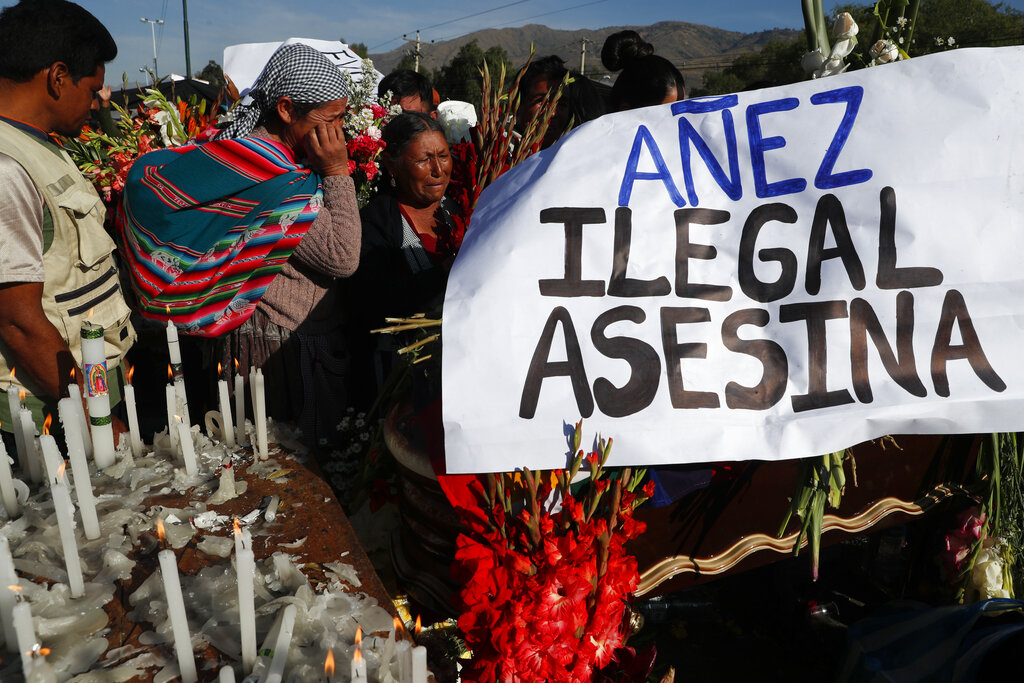A UN envoy met with Bolivia’s interim President on Saturday to find a way out of the country’s political crisis while the world body expressed concern the situation could “spin out of control” amid a rising death toll.
On leaving the meeting with interim leader Jeanine Áñez, envoy Jean Arnault said the United Nations hopes it can contribute to an “accelerated pacification process” leading to new elections following the resignation and exile of Evo Morales.
Meanwhile, another international body, the Inter-American Commission on Human Rights, condemned Áñez’s government for issuing a decree it says “exempts from criminal responsibility” soldiers who took part in efforts to break up protests and unrest that have left at least 23 people dead.
The norm was approved before the most violent day since the crisis began, when at least eight pro-Morales coca growers were killed when security forces opened fire during a demonstration.
“It is not a license for the armed forces to kill,' presidency minister Jerjes Justiniano told a press conference. He said the decree is based on the criminal code, which states that 'if one defends oneself in self-defense, there is no penalty.”
Earlier on Saturday, UN human rights chief Michelle Bachelet issued a statement calling the deaths “an extremely dangerous development.”
“I am really concerned that the situation in Bolivia could spin out of control if the authorities do not handle it sensitively and in accordance with international norms,” she said.
Protesters said police fired on Friday when demonstrators tried to cross a military checkpoint in Sacaba, a town near Cochabamba. Many of the protesters were coca leaf growers loyal to Morales, who had been Bolivia’s first indigenous President before being pressured to step down by Bolivia’s military chief after weeks of widespread protests over a disputed election.
Witnesses to the clash described seeing the bodies of several protesters and dozens of people rushed to hospitals, many covered in blood. On Saturday, Bolivia’s national Ombudsman’s Office raised the death toll to eight. It said that overall 23 people had been killed in the violence.
Police and soldiers broke up fresh blockades of flaming logs and tractors on Saturday on the road linking Sacaba to Cochabamba, but there were no immediate reports of deaths.
Morales, who was granted asylum in Mexico after his November 10 resignation, said on Twitter that a “massacre” had occurred and he described the interim government led by Áñez as a dictatorship.
On Friday, Áñez said Morales would face possible legal charges for election fraud if he returned home from Mexico City. She has also said Morales would not be allowed to participate in a new presidential election, which is supposed to be held within three months.
The ousted leader, meanwhile, contended this week that he is still the President since the country’s legislature has not yet approved his resignation.
Morales stepped down following nationwide protests over suspected vote-rigging in an October 20 election, which he claimed to have won to gain a fourth term in office. Morales has denied there was fraud, though an Organization of American States audit reported widespread irregularities.
“We’re not going to let them make us flee, nor humiliate us. Let me say to Mrs. Añez that she must denounce this. If not the whole country is going to close in on her,” said Enrique Mamani, a local resident. “They have carried out a state coup, paid off the military, paid off the police. There’s political persecution against our leaders.”
Backers of the interim government deny there was any coup against Morales, saying police and the military withdrew backing from him only to avoid shedding civilian blood during the mass protests against him.
Supporters of Morales, who was Bolivia’s President for almost 14 years and was the last survivor from the “pink tide” of South American leftist leaders, have been staging disruptive protests since his resignation, setting up blockades that forced closure of schools and caused shortages of gasoline in the capital.
Áñez, who had been the highest-ranking opposition official in the senate, proclaimed herself President after Morales resigned, saying every person in the line of succession ahead of her — all of them Morales backers — had resigned.
The Constitutional Court issued a statement backing her claim that she didn’t need to be confirmed by Congress, a body controlled by Morales’ Movement Toward Socialism party.
Much of the opposition to Morales sprang from his refusal to accept a referendum that upheld term limits that barred him from seeking another term. He got the courts to declare the limits a violation of his human rights to seek office.











